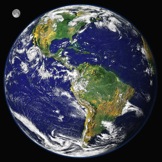Thursday, May 30th - Con Edison Building, NYC
Abstracts

Challenges and Opportunities in
Climate Change
Abstract: Session 4 - Smoke and Mirrors: Is Geoengineering a Solution to Global Warming?
Presenter: Dr. Alan Robock, Professor II, Rutgers University, Dept. of Environmental Sciences, School of Environmental and Biological Sciences. Bio
In response to the global warming problem, there has been a recent renewed interest in geoengineering “solutions” involving “solar radiation management” by injecting particles into the stratosphere, brightening clouds, or blocking sunlight with satellites between the Sun and Earth. While volcanic eruptions have been suggested as innocuous examples of stratospheric aerosols cooling the planet, the volcano analog actually argues against geoengineering because of ozone depletion and regional hydrologic responses.
Dr. Robock will describe different proposed geoengineering designs, and then show climate model calculations that evaluate both their efficacy and their possible adverse consequences. No such systems to conduct geoengineering now exist, but a comparison of different proposed stratospheric injection schemes, using airplanes, balloons, and artillery, shows that using airplanes to put sulfur gases into the stratosphere would not be expensive.
Nevertheless, it would be very difficult to create stratospheric sulfate particles with a desirable size distribution. Our GeoMIP project, conducting climate model experiments with standard stratospheric aerosol injection scenarios, is ongoing, but has already shown that temperature and precipitation responses would be uneven globally.
If there were a way to continuously inject SO2 into the lower stratosphere, it would produce global cooling, stopping melting of the ice caps, and increasing the uptake of CO2 by plants. But there are at least 26 reasons why geoengineering may be a bad idea. These include disruption of the Asian and African summer monsoons, reducing precipitation to the food supply for billions of people; ozone depletion; no more blue skies; reduction of solar power; and rapid global warming if it stops.
Furthermore, the prospect of geoengineering working may reduce the current drive toward reducing greenhouse gas emissions, there are concerns about commercial or military control, and it may seriously degrade terrestrial astronomy and satellite remote sensing. Global efforts to reduce anthropogenic emissions and to adapt to climate change are a much better way to channel our resources to address anthropogenic global warming
Reserve Now.
Back to: Conference Homepage AIChE, Metro NY Home



